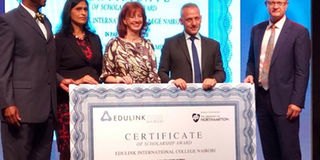SPONSORED: Want a UK degree in Kenya? Try Edulink International College

From left: Gitonga M’Mbijjewe (Edulink Campus Director), Rashmi Dravid (Principal Lecturer, International Development School of Science and Technology, University of Northampton), Professor Helen Mason (Group Academic Director), Dr Holger Siemons (Associate Professor of Business School, University of Northampton) and Tony Reilly OBE (Country Director - British Council Kenya) during the partnership launch of Edulink International College and University of Northampton at Radisson-Blu hotel, Nairobi, September 13, 2016.
What you need to know:
Undergraduate Academic Programmes at Edulink
- BA (Hons) Business Studies
- BA (Hons) Business and Accounting
- BA (Hons) Business and Entrepreneurship
- BA (Hons) Business and Marketing Management
Higher education in Kenya has received a fresh boost with the entry of Edulink International College Nairobi.
Located at the Ndemi Road-Ngong Road junction, a prime area near Adams Arcade mall, the institution is offering UK degrees in partnership with the University of Northampton.
In April 2016, EICN, as the college is also known in abbreviated form, was accredited by the Commission for University Education to offer degree programmes from the University of Northampton.
The established university is ranked among the top 50 in the UK. According to the Guardian University League Tables 2015, it further enjoys a student satisfaction score of 98 per cent, and its graduates have a 96 per cent chance of getting employed. For that, the university’s degrees are a desirable choice.
That’s the opportunity EICN brings to Nairobi by offering business degree courses from the University of Northampton.
EICN was set up two years ago, and is also licensed by the Technical and Vocational Education and Training Authority (TVETA).
The principal, Mr Gitonga M’Mbijjewe, says the institution’s location in Nairobi is ideal due to the city’s strategic position in East and Central Africa. Students from the region can easily gain access. Besides, the growing demand for market-ready graduates as multinationals and foreign organisations establish ventures in Nairobi makes the setting up of Edulink in Kenya’s capital city a well-timed decision.
These aside, Kenya plays high in terms of education standards, making the country a fertile ground for any serious academic institution to set base in. The cosmopolitan atmosphere in Nairobi adds to the city’s relevance to EICN, which is itself a multicultural learning environment.
“There is also the added advantage of a reduced financial load on the parents. The presence of the college here eliminates the need for expensive fees, travel and accommodation abroad. Learning in a familiar environment is a great asset in adjusting to university education. This is an important factor in a student’s success,” Mr M’Mbijjewe points out.
EICN, he adds, is committed to producing industry-ready graduates. The college pursues this through strategic linkages with well-chosen industry players. “Professionals will be drawn from industries such as banking, insurance, telecoms, etc, to augment students’ learning by blending the classroom experience with real life exposure. This will help in developing the student holistically to meet the demands of industry,” the principal explains.
The college uses a ground-up approach, where it networks with public and private sector organisations to ensure that its graduates are readily absorbed into the market. Moreover, the faculty looks at real market issues to match with the institution’s curriculum.
Learning includes field trips, expose students to the realities in industry as they witness and feel what they learn in class. They also get to see the needed skill-sets, and identify gaps and challenges they can work on to position themselves competitively in the market. This infuses a strong blend of industry and academia in the learning process at Edulink.
An additional strength to learning at EICN is its deliberate attention to delivery of soft skills too. Rachel Butterfield, the head of Business and Foundation Studies, observes that Edulink students are taken through both written and verbal presentation and negotiation skills to produce a well-rounded graduate.
Small class sizes of not more than 25 students enhance the student-lecturer interaction, creating a fully-engaged learning environment. “The lecturer is able to focus on each learner’s needs,” says Mr M’Mbijjewe.
Butterfield adds: “The faculty comprises visiting lecturers who have got international exposure, industry professionals and accomplished academics from Kenya.” This cosmopolitan mix and knowledge sharing gives students a feel of international learning.
“We are producing the human capital that would design and develop the next Kenya,” Mr M’Mbijjewe says. With this, EICN will be contributing immensely to meeting new and emerging demands for business and economic growth in Kenya and Africa.
Structurally and technologically, the college is pleasantly built and designed, and is fitted with the latest communication infrastructure. All students have access to computers and a digital library with thousands of books, journals and databases.
It neighbours iHub and Nairobi Garage, both of which provide opportunities for students’ exposure, making them more functional entrepreneurs rather than just students who have studied entrepreneurship.
“We want to expose our students with experiential business learning. This way, they hatch their businesses before they graduate,” says Rachel Butterfield.




